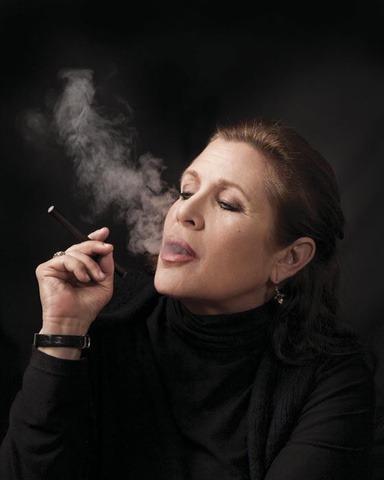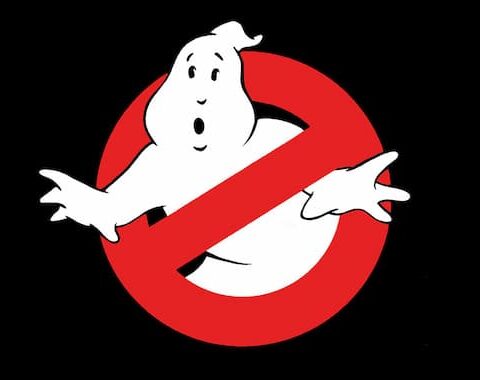You never forget your first love, they say.
Carrie Fisher was my first crush – and my infatuation with Princess Leia as a little boy was the closest to falling in ‘love’ that a five or six year-old boy is likely to experience.
Princess Leia – to my childhood eyes – was the most beautiful human being that could’ve been conceived of. To my more grown-up eyes now, nothing has really changed. Carrie Fisher in that role is still my absolute standard by which ‘beautiful’ is measured.
And I still retained my crush on Carrie Fisher and Princess Leia all through these years.
But it wasn’t just a crush: Princess Leia was also my heroine. A poster of her – in white Empire garb and holding a blaster, and which I’ve had forever – is still on my wall and probably always will be.
Princess Leia wasn’t just about beautiful, however: that would be selling the character – and the life that Carrie Fisher breathed into her – ridiculously short. It was about much more than that; and, in the same way, Carrie Fisher was more than just Princess Leia – though, as someone who’s been enamored with Star Wars my entire life, it is admittedly very difficult to talk about Carrie Fisher without talking a lot about her role as one of the most iconic figures in cinematic history.

As I said, with Leia, it wasn’t just about beautiful. She was everything: a hero, an idealist, brave, funny, charming, defiant, sensitive, bad-ass. She was every bit as bad-ass as Han Solo; and Carrie was every bit as charismatic as Leia as Harrison Ford was as Solo – but, as a young woman, got less credit for that than Harrison did for his charisma.
Leia generally probably isn’t given enough credit for how much of a heroine she was and how monumental a female character she was: this was long, long before any meaningful trend of tough, female heroes in cinema. George Lucas’s Princess was cradling blasters, commanding battles and fighting the good fight at a time when the female archetype in Hollywood fantasy was still the damsel in distress needing to be rescued or the helpless woman falling in love with the dashing male lead.
And then here was Leia; leading a rebellion to save the galaxy, commanding troops, riding speeder-bikes through the forest and shooting down Stormtroopers (Leia still stands as the best shot in all of Star Wars – she never misses) and throwing out witty put-downs left, right and centre.
For all the talk of Daisy Ridley’s newer role being one of feminist heroism or the talk around ’empowered’ female characters in modern film, it was Leia – and the way especially that Carrie Fisher embodied her – that set the standard and carried that flag for decades.

And no one but Carrie Fisher could’ve done it with so much effortless charm and spark.
You don’t just love Leia because she’s beautiful, you fall in love with her as a character. And even the being beautiful was a totally atypical type of thing; she wasn’t glamorous or precious – she was a tragic figure in a dirty, beat-up universe; yet, when I watch Carrie Fisher in Empire Strikes Back or Return of the Jedi, I cannot think of any actress in cinema who radiated such a lucid type of beauty – that is both proud and dignified, yet vulnerable and sensitive – in moments or visuals that would endure so long.
I’d literally have to go back to Greta Garbo or someone like that – and even then, I’m not sure it’s the same thing.
If anything, Lucas’s story went out of its way to make Leia not about aesthetic: until Return of the Jedi, for two whole films there’s nothing remotely glamorous or sexual about Leia at all. Her wardrobe is all business and, if anything, she’s played as a mixture of tom-boy, kid sister and soldier. In fact, Lucas famously made Carrie tape down her breasts underneath her costume in A New Hope because he wanted there to be no hint or suggestion of glamour or sexuality.
Yet it did nothing to stop people falling in love with her.
Every time I watched those films as a kid I was in perpetual adoration of Princess Leia every bit as much as I was hero-worshiping Luke Skywalker. And when I watch those films now, she is as much the hero of the story as Luke is: and Carrie Fisher is absolutely the equal to her two main co-stars in terms of what she brings to the screen. You could just never replace her in a million years.

She was also absolutely unmatched as a face actress: some of those shots or close-ups on Carrie’s face in key, emotional moments of Empire have been burned into my mind all my life. Her face, her eyes, could tell a whole, vivid story in a microcosm – she would’ve been an amazing silent-movie actress, as she could do so much without any dialogue. George had often said that Star Wars was conceived, in large part, like a silent movie – in that context, no one was better than Carrie Fisher at making that dynamic powerful.
This extraordinary lucidity to Carrie Fisher’s face was a major feature last year in The Force Awakens too, where she had a smaller role, but was able to convey or capture so much vivid emotion just in silent close-ups. You really have to watch those Leia scenes – especially in the final third of Empire – again to remind yourself of how powerful a conveyor her face was.
Leonardo Da Vinci would’ve adored painting her portrait.
Those images will never leave my mind. And Carrie Fisher will always occupy a place in both our cultural and collective-mythic landscape and in my own personal mindscape that will stay unparalleled.
But it has always baffled as to why Carrie Fisher didn’t become a ‘leading actress’ after Star Wars.
Whether, like Mark Hamill, it was a case of being too identified with too iconic a character, or whether it was something else, we don’t know for sure. But given her blatant talent as an actress, given her – and forgive me for saying it again – her obvious aesthetic screen presence, and given her intelligence, charisma and even her family background (she recently talked about being the “product of Hollywood inbreeding”), she should’ve been the female movie star of her generation – absolutely equal to what Harrison Ford became.
Although she appeared in various films and TV roles, for whatever mixture of reasons, that ‘A-List’ movie career didn’t happen.

I always wonder if it was pure, 80s Hollywood sexism: that she was too edgy, too intelligent and had too much personality to fit the leading actress roles in rom-coms or love stories and too bound to an iconic character to be considered for the more serious, ‘worthy’ roles either.
But the truth is that Carrie Fisher acquired more of an imperishable cultural immortality just by that one role of Princess Leia than most other actresses – including more ‘successful’ A-listers like Julia Roberts or Nicole Kidman – will achieve in entire careers. People will still be watching or remembering that role and those performances decades and decades from now, long after many of the leading ‘A-list’ actresses of the 80s, 90s or right now will be largely forgotten.
And she is still the standard by which my mind – subconscious or otherwise – measures all beautiful things.
But the thing too about Carrie Fisher as a personality beyond Princess Leia is that she was so not disappointing: she was so funny, so edgy and so ridiculously intelligent – about as polar opposite to the vacuous Hollywood actress archetype as you could get. She had so much to say and so much to offer that, when she wasn’t being given significant movie roles, she instead channeled her energies into script writing and editing, informal counselling, public speaking and much more.
She wrote significant and brutally honest books, was a major voice in discussions on mental health, leading – among other things – Harvard College to award her its Annual Outstanding Lifetime Achievement Award in Cultural Humanism earlier just this year.
Postcards From the Edge, the semi-autobiographical novel she wrote in the late 80s, is something I only got to reading a couple of years ago – and, frankly, only because of who its author was. But it’s a compelling, compulsive piece of literature that showed how talented and engaging Carrie Fisher was and demonstrated that she could pretty much turn her hand towards anything and could’ve been a great novelist.
The Princess Diarist, her recent, controversial book detailing her experiences in the early Star Wars era, is something I’m yet to read; but doing so now will be much more bittersweet than it was going to be.
I’m sure I’d have a lot more to say about Carrie Fisher; but I was already burnt out days ago, and the announcement of Carrie Fisher’s passing has burnt me out completely. So I’m probably done for this year. 2016 can fuck off – and not a moment too soon.
Perpetual thanks, Carrie Fisher, the People’s Princess – and still the only royalty I would ever bow to. Words aren’t enough.





R.I.P, we have lost a true great.
R.I.P. the people’s Princess!
Awesome piece! 🙂 –Paul